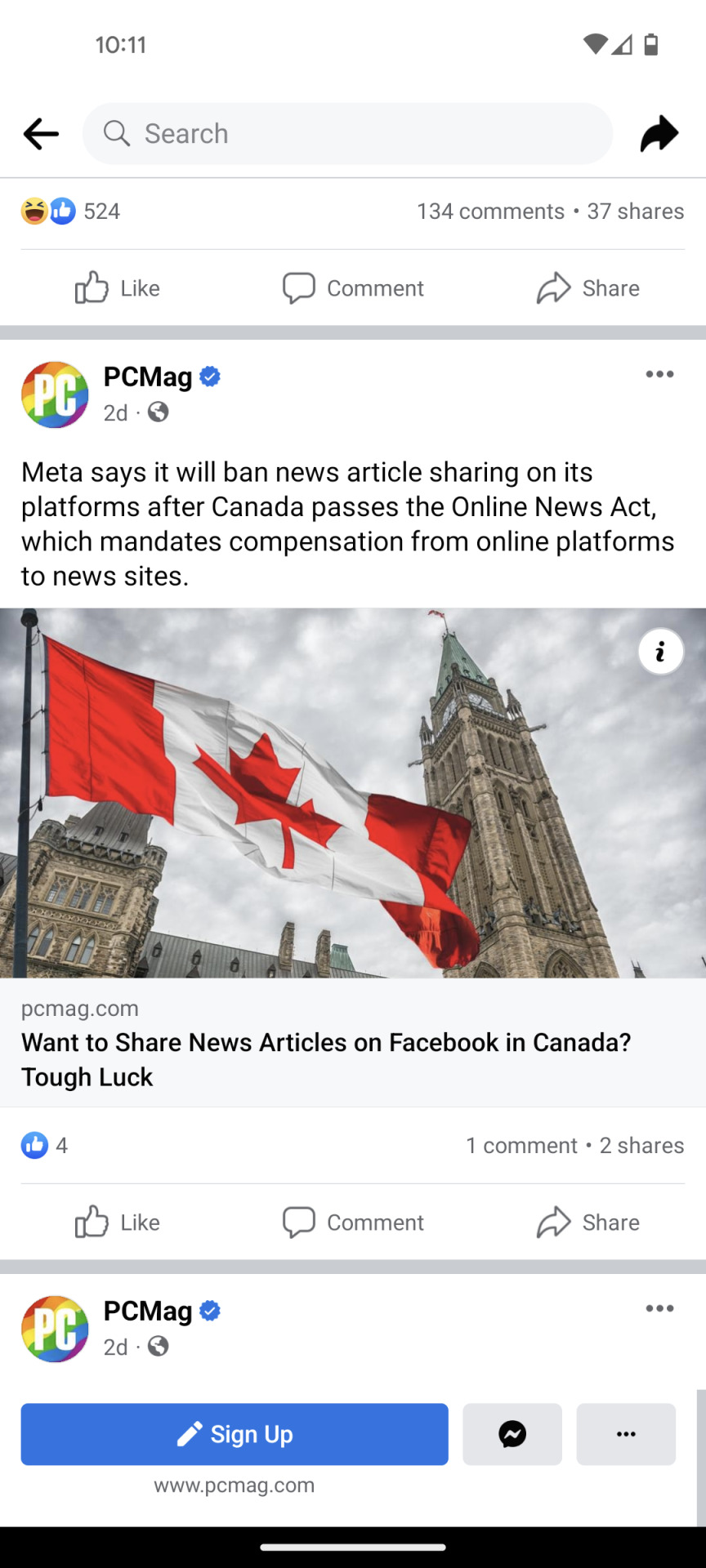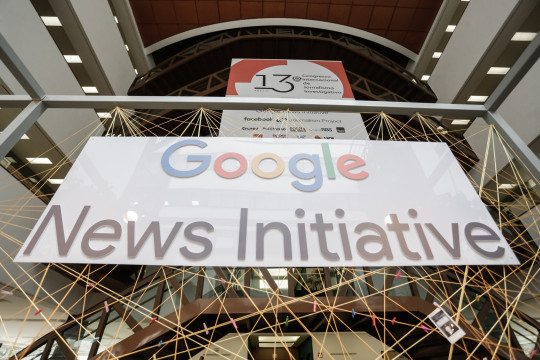#link tax
Text
EU to Facebook: 'Drop Dead'

A leak from the European Data Protection Board reveals that the EU’s top privacy regulator is about to overrule the Irish Data Protection Commission and declare Facebook’s business model illegal, banning surveillance-based ads without explicit consent:
https://noyb.eu/en/noyb-win-personalized-ads-facebook-instagram-and-whatsapp-declared-illegal
In some ways, this is unsurprising. Since the GDPR’s beginning, it’s been crystal clear that the intention of the landmark privacy regulation was to extinguish commercial surveillance and ring down the curtain on “consent theater” — the fiction that you “agree” to be spied on by clicking “I agree” or just by landing on a web-page that has a link to some fine-print.
Under the GDPR, the default for data-collection is meaningful consent, meaning that a company that wants to spy on you and then sell or use the data it gathers has to ask you about each piece of data they plan to capture and each use they plan to make of it.
These uses have to be individually enumerated, and the user has to actively opt into giving up each piece of data and into each use of that data. That means that if you’re planning to steal 700 pieces of information from me and then use it in 700 ways, you need to ask me 1,400 questions and get a “Yes” to each of them.
What’s more, I have to be given a single tickbox at the start of this process that says, “No to all,” and then I have to be given access to all the features of the site or service.
The point of this exercise is to reveal consent theater for the sham it is. For all that apologists for commercial surveillance insist that “people like ads, so long as they’re well-targeted” and “the fact that people use high-surveillance services like Facebook shows a ‘revealed preference’ for being spied on,” we all know that no one likes surveillance.
There’s empirical proof of this! When Apple added one-click tracker opt-out on its Ios platform, 96% of users opted out, costing Facebook more than $10b in the first year (talk about a ‘revealed preference!’) (of course, Apple only opted those users out of tracking by its rivals, and secretly continued highly invasive, nonconsenual tracking of its customers):
https://pluralistic.net/2022/11/14/luxury-surveillance/#liar-liar
Properly enforced, the GDPR would have upended the order of the digital world: any argument about surveillance between product managers at a digital firm would have been settled in favor of privacy, because the pro-privacy side could argue that no one would give consent, and the very act of asking would scare off lots of users.
But the GDPR wasn’t properly enforced, thanks to structural problems with European federalism itself. The first line of GDPR enforcement came from privacy regulators in whatever country a privacy-violator called home. That meant that when Big Tech companies violated the GDPR, they’d have to account for themselves to the privacy regulator in Ireland.
For multinational corporations, Ireland is what old-time con-artists used to call a “made town,” where the cop on the beat is in on the side of the criminals. Ireland’s decision to transform itself into a tax haven means that it can’t afford to upset the corporations that fly Irish flags of convenience and maintain the pretense that all their profits are floating in a state of untaxable grace in the Irish Sea.
That’s because there are plenty of other EU countries that compete with Ireland in the international race to the bottom on corporate governance: Malta, Luxembourg, the Netherlands, Cyprus, etc (and of course, there’s post-Brexit UK, where the plan is to create an unregulated haven for the worst, wealthiest companies in the world).
All this means that seeking Irish justice from a corporation that wronged you is like asking a court in Moscow to punish an oligarch’s commercial empire on your behalf. Irish regulators are either “dingo babysitters” (guards in league with the guarded) or resource-starved into ineffectual torpor.
That’s how Facebook got away with violating the GDPR for so many years. The company hid behind the laughable fairy-tale that it didn’t need our consent to spy on us because it had a “legitimate purpose” for its surveillance, namely, that it was contractually obliged to spy on us thanks to the “agreement” we clicked on when we signed up for the service.
That is, you and Facebook had entered into a contract whereby Facebook promised you that it would spy on you, and if it didn’t spy on you, it would be violating that promise.
Har.
Har.
Har.
But while the GDPR has a structural weakness — allowing corporations to choose to be regulated in countries that can’t afford to piss them off — it also has a key strength: the private right of action, that is, the right of individuals to sue companies that violate the law, rather than having to convince a public prosecutor to take up their case.
https://www.eff.org/deeplinks/2019/01/you-should-have-right-sue-companies-violate-your-privacy
The private right of action is vital to any privacy regulation, which is why companies fight it so hard. Whenever a privacy bill with a private right of action comes up, they tell scare-stories about “ambulance chasers” who’ll “clog up the system,” trotting out urban legends like the McDonald’s Hot Coffee story:
https://pluralistic.net/2022/06/12/hot-coffee/#mcgeico
But here we are, in the last days of 2022, and the private right of action is about to do what the Irish regulators wouldn’t do: force Facebook to obey the law. For that, we can thank Max Schrems and the nonprofit he founded, noyb.
Schrems, you may recall, is the Austrian activist, who, as a Stanford law student, realized that EU law barred American tech companies from sending their surveillance data on Europeans to US data-centers, which the NSA and other spy agencies treated as an arm of their own surveillance projects:
https://pluralistic.net/2020/07/16/text-adventures-resurgent/#nein
Schrems brought a case against the Irish regulator to the EU’s top privacy authority, arguing that it had failed its duty by ruling that Facebook’s “contractual obligation” excuse held water. According to the leaked report, Schrems has succeeded, which means, once again, Facebook’s business model is illegal.
Facebook will doubtless appeal, but the writing is on the wall here: it’s the end of the line for surveillance advertising in Europe, an affluent territory with 500m+ residents. This decision will doubtless give a tailwind to other important privacy cases in the EU, like Johnny Ryan’s case against the ad-tech consortium IAB over its “audience taxonomy” codes:
https://pluralistic.net/2021/06/16/inside-the-clock-tower/#inference
It’s also likely good news for Schrems’ other ongoing cases, like the one he’s brought against Google:
https://pluralistic.net/2020/05/15/out-here-everything-hurts/#noyb
Facebook has repeatedly threatened to leave the EU if it is required to stop breaking the law:
https://pluralistic.net/2020/09/22/uncivvl/#fb-v-eu
This is a pretty implausible threat, growing less plausible by the day. The company keeps delivering bad news to investors, who are not mollified by Mark Zuckerberg’s promise to rescue the company by convincing all of humanity to spend the rest of their lives as highly surveilled, legless, sexless, low-polygon cartoon characters:
https://www.fool.com/investing/2022/12/06/why-meta-platforms-stock-dove-today/
Zuckerberg and his entire senior team have seen their net worth plummet with Meta’s share price, and that means the company needs to pay engineers with actual dollars, rather than promises of shares, which kills the massive wage-bill discount the company has enjoyed. This is not a company that can afford to walk away from Europe!
Between Apple’s mobile (third-party) tracker-blocking and the EU calling time on surveillance ads, things are looking grim for Facebook. You love to see it! But things could get even worse, and soon, thanks to the double-edged sword of “network effects.”
Facebook is a network effects business: people join the service to socialize with the people who are already there — then more people join to socialize with them. But what network effects give, they can also take away: a service that gets more valuable when a new user signs up loses value when that user leaves.
This is beautifully explained in danah boyd’s “What if failure is the plan?” which recounts boyd’s experiences watching MySpace unravel as key nodes in its social graph disappeared when users quit: “Failure of social media sites tends to be slow then fast”:
http://www.zephoria.org/thoughts/archives/2022/12/05/what-if-failure-is-the-plan.html
Facebook long understood this, which is why it spent years creating artificial “switching costs” — penalties it could impose on users who quit, such as the loss of their family photos:
https://www.eff.org/deeplinks/2021/08/facebooks-secret-war-switching-costs
This is why Facebook and other tech giants are so scared of interoperability, and why they are so furious about the new EU Digital Markets Act (DMA), which will force them to allow new services to connect to their platforms, so that users who quit Big Tech won’t have to lose their friends or data:
https://www.eff.org/deeplinks/2022/04/eu-digital-markets-acts-interoperability-rule-addresses-important-need-raises
An interoperable Facebook would make it easy to leave social media by removing the penalties Facebook imposes on its disloyal users, and the EU’s privacy framework means that when they flee to a smaller safe haven, they won’t have to worry about commercial surveillance:
https://www.eff.org/interoperablefacebook
But what about advertising-supported media? Sure, being spied on sucks, but a subscription-first media landscape is a world where “the truth is paywalled, but the lies are free”:
https://www.currentaffairs.org/2020/08/the-truth-is-paywalled-but-the-lies-are-free/
Ironically, killing surveillance ads is good news for ad-driven media. Surveillance-based ad-targeting is nowhere near as effective as Google, Facebook and the other ad-tech companies claim (these companies are compulsive liars, it would be amazing if the only time they told the truth is when they were boasting about their products!):
https://onezero.medium.com/how-to-destroy-surveillance-capitalism-8135e6744d59
And consent-theater or no, targeted ads reach fewer users every day, thanks to ad- blockers, AKA, “the biggest boycott in world history”:
https://blogs.harvard.edu/doc/2015/09/28/beyond-ad-blocking-the-biggest-boycott-in-human-history/
And when a publisher does manage to display a targeted ad, they get screwed. The Googbook dupololy is a crooked affair, with the two tech companies illegally colluding (via the Jedi Blue conspiracy) to divert money from publishers to their own pockets:
https://techcrunch.com/2022/03/11/google-meta-jedi-blue-eu-uk-antitrust-probes/
Targeted ads are a cesspit of ad-fraud. 15% of all ad revenues are just unaccounted for:
https://twitter.com/swodinsky/status/1511172472762163202
The remaining funds aren’t any more trustworthy. Ad-tech is a bezzle (“the magic interval when a confidence trickster knows he has the money he has appropriated but the victim does not yet understand that he has lost it”):
https://pluralistic.net/2021/01/04/how-to-truth/
As Tim Hwang foretold in his essential Subprime Attention Crisis, the pretense that targeted ads are wildly effective has been slowly but surely losing ground to the wider awareness of the fraud behind the system, and a reckoning is at hand:
https://pluralistic.net/2020/10/05/florida-man/#wannamakers-ghost
Experiments with contextual ads (ads based on the content of the page you’re looking at, not on your behavior and demographics) have found them to about as effective in generated clicks and sales as surveillance ads.
https://pluralistic.net/2022/04/29/taken-in-context/#creep-me-not
But this is misleading. Contextual ads don’t require consent opt-in (because they’re not based on your data) and they don’t drive users to install blockers the way creepy surveillance ads do, so lots more people will see a contextual ad than a surveillance one. Thus, even if contextual ads generate slightly less money per reader or viewer, they generate far more money overall, because they are aren’t blocked.
Even better for publishers: contextual ads don’t erode their own rate cards. Today, when you visit a high-quality publisher like the Washington Post, many ad brokers bid to show you an ad, but only one wins the auction. However, all the others have tagged you as a “Washington Post reader,” and they can sell that to bottom-feeder junk sites. That is, they can collude with Tabooleh or its rivals to offer advertisers a chance to advertise to Post readers at a fraction of what the Post charges. Lather, rinse, repeat, and the Post’s own ad revenues are drained.
This doesn’t apply with contextual ads. Indeed, none of the tech giants’ much-vaunted “data advantage” — the largely overstated value of knowing what you did online 10 or 20 years ago, the belief in which keeps new companies out of the market — applies to context ads:
https://pluralistic.net/2021/04/11/halflife/#minatory-legend
The transformative power of banning surveillance advertising goes beyond merely protecting our privacy. It also largely answers the case for “link taxes” (pseudo-copyright systems that let giant media companies decide who can link to them and charge for the privilege).
The underlying case for link taxes, snippet taxes, etc, is that Big Tech is stealing the news media’s content (by letting their users talk about and quote the news), when the reality is that Big Tech is stealing their money (through ad-fraud):
https://doctorow.medium.com/big-tech-isnt-stealing-news-publishers-content-a97306884a6b
Unrigging the ad-tech market is a much better policy than establishing a link-tax, like the Democrats are poised to do with their Journalism Competition and Preservation Act (JCPA):
https://www.politico.com/newsletters/politico-influence/2022/12/06/jcpa-opponents-spring-into-action-to-block-ndaa-inclusion-00072602
It’s easy to understand why the monopoly/private-equity-dominated news industry wants JCPA, rather than a clean ad market. The JCPA just imposes a tax on the crooked ad-tech giants that is paid to the largest media companies, while a fair ad market would reward the media outlets that invested most in news (and thus in expensive, unionized news-gathering reporters).
Indeed, the JCPA only works if the ad-tech market remains corrupt: the excess Big Tech rents that Big News wants to claim here are the product of a rigged system. Unrig the system and there won’t be any money to pay the link tax with.
Image:
Anthony Quintano (modified)
https://commons.wikimedia.org/wiki/File:Mark_Zuckerberg_F8_2018_Keynote_%2841118883004%29.jpg
CC BY 2.0
https://creativecommons.org/licenses/by/2.0/deed.en
[Image ID: A theater proscenium. Over the proscenium, in script, are the words 'Consent Theatre.' On the screen is an image of Mark Zuckerberg standing in front of the words 'Data Privacy.' He is gesturing expansively. A targeting reticle is centered on his face. The reticle is made of the stars from the EU flag.]
#pluralistic#zuckerberg#zucked#facebook#social media deathwatch#private right of action#gdpr#surveillance advertising#contextual advertising#consent theater#link tax#snippet tax#surveillance#commercial surveillance#business#news#eu#dma#DSA#max schrems#noyb#corruption#ireland
317 notes
·
View notes
Text
Weekly output: FCC updates broadband map, Meta vs. California link-tax bill, passkeys, Mark Vena podcast
A holiday-shortened week got a little shorter with an overnight trip to New York for a press-preview event put on by the people behind the IFA trade show that’s brought me to Berlin since 2012.
In addition to the posts below, Patreon readers got a bonus: my thoughts on note-taking alternatives to a significantly more expensive Evernote.
5/30/2023: FCC Updates Broadband Map With New ISP Data,…

View On WordPress
#1Password#account security#apple#authentication#California Journalism Protection Act#link tax#login#Mark Vena#passkey#passkeys#Patreon#wwdc
2 notes
·
View notes
Text
How Bill C-11, Bill C-18, and Online Harms Will Collectively Ruin the Canadian Internet
How Bill C-11, Bill C-18, and Online Harms Will Collectively Ruin the Canadian Internet
The trifecta of bad bills, Bill C-11, Bill C-18, and Online Harms will ruin the internet in Canada. We explain.
(more…)

View On WordPress
2 notes
·
View notes
Text
Why the Government’s Draft Bill C-18 Regulations Don’t Work: The 4% Link Tax is Not a Cap. It’s a Floor.
The Online News Act has quickly emerged as one of the government’s biggest policy failures with Canadian news outlets facing lost traffic, lost revenues, and lost competition. The source of the Bill C-18 failure was the government’s seeming inability or unwillingness to game plan the potential outcomes of the law, rejecting criticisms and calls for a “Plan B” by instead relying on the hope that…

View On WordPress
0 notes
Text

what if he was webkinz
#if you saw me post this like an hour ago. no you didnt (i saw stuff i wanted to change)#anyway this was todays warmup doodle i think . i thought the idea would be cute :]#i thought abt doing some more sprite edits but finding resources for webkinz is. surprisingly taxing nd not super well documented#sad. but thats the way it is ig#wolf link#tp link#twilight princess#loz#loz fanart#webkinz#my art
898 notes
·
View notes
Text
hey! hi! the cartoonist cooperative has an e-sim drive for gaza, offering art for e-sim donations (instructions etc in the link)
#I usually keep politics posting to Twitter bc of reach/impact#like I’d rather spend my time calling state reps telling them I don’t want my fucking tax money to go to bombing civilians#than explain to a tumblr user that no you don’t get a pass to use ultra/ethnonationalist talking points because you’re#too busy choking on government boot to realize that you’re being 1800s racist#but I haven’t seen the donation drive making rounds on here so if getting art prompts you to helping people#keep connected please check it out. the artists available and instructions are all on the page linked etc.#anyway. in case it was not clear. none of us are free until all of us are free. death to imperialism. etc.
424 notes
·
View notes
Note
*Aggressively throws ravioli at you*
I feel like I’m trying to bribe or tempt people into the ship lol. But it’s so worth it


I am being
Ravioli'd D:

#No but for real they have an interesting dynamic I like them#But I also love to see them being married platonically for the taxes lmao#I just like seeing them interact whether they kiss or not :D#Thanks for your ask Breanna :) I hope my silly answer made you smile !#linked universe#ravioliship#ravioli ship#I don't remember which tag is the right one so. both is good#lu legend#lu ravio#ask answer#my art#(?)
67 notes
·
View notes
Text







The Legend of Zelda: Everything Is On Fire
tumblr please don't kill the image quality i'm begging you
#legend of zelda#zelda#link#ganondorf#original zelda concept#THIS TOOK ALL FUCKING DAY I'M SO ALDJFLKEJNASF#this is not gonna make any sense to the wider audience#but the name of this AU is 'tax evasion zelda'#tax evasion zelda#bon apetit my dudes#i haven't drawn a comic in so fucking long.#comic
294 notes
·
View notes
Text

I just think they’re neat
#legend and his tax evasion husband and dream girlfriend for the win#linked universe#lu legend#lu ravio#lu marin#idk if they have a ship name or what#legend/ravio#legend/marin#legend/ravio/marin#edit: learned their ship name is mavioli THAT’S AMAZING#mavioli#brenda's art
419 notes
·
View notes
Text

he's just thinking ahead
alt with no text below

#albw ravio#ravio#loz#legend of zelda#linked universe#the legend of zelda#albw#lu legend#my art#hes trying to convince legend they should get married#purely for taxes#cut to legend 4 years later trying to file taxes#he regrets not taking the offer
70 notes
·
View notes
Text
I have taxes to do, who wants to study/work with me and the blorbos?
Zelda groaned as she laid face down on the bed. Her companion stared at her, bemused as he raised an eyebrow. "Uh... you good over there, Princess?"
Slowly lifting her head, she glared at him under a heavy brow and disheveled curls. "I hate paperwork."
"What paperwork?" Link asked, crossing his arms and growing even more bewildered. This was the first she'd mentioned such an issue on her Epic Search of The Hero that had to involve him.
"I promised my mother I'd help sort out a negotiation with the Zora," Zelda explained. "But I have to read all this stupid rhetoric and figure out what they're even trying to say."
"You... brought homework on your quest to find the Hero." Link surmised.
A loud snort emitted from downstairs in the small home that had been gifted to them. Zelda huffed, yelling down the stairs, "I have a kingdom to run, okay?! At least I'm doing my duty!"
Link looked between the irate princess and the shadows of their elder companion downstairs as he flopped lazily onto the ground beside his beloved dog. Friend barked happily, scurrying up the stairs and then back down, tail tucked in excitement as she made the lap two, three, four times.
"Do you, uh, need help?" Link offered hesitantly. He wasn't exactly good at treaties, but he'd had to read a few contracts for his business.
"That would be great, actually," Zelda quipped, immediately perking up. Link was starting to regret this. She added loudly, "Our friend can help us too."
"I can't read," came the dull reply.
Zelda shot to her feet. "That's a lie and you know it!!"
"I mean..." Link shrugged. "He does live in the woods."
"He still won't even tell me his name," Zelda moaned, rolling her eyes. "I know you're the Hero, you jerk!"
Another snort from downstairs.
Link sighed as he grabbed the parchment from the princess' loose grip. This was going to be a long night.
#writing#forsaken au#gerudo link is the only adult right now#then again mystery link knows the true dangers of the world: paperwork#I don't blame him for avoiding it#friend got the zoomies#who wants to do some work with me because I NEED to get these stupid taxes done#UGH
73 notes
·
View notes
Text
Everything advertised on social media is overpriced junk

In “Behavioral Advertising and Consumer Welfare: An Empirical Investigation,” a trio of business researchers from Carnegie Mellon and Pamplin College investigate the difference between the goods purchased through highly targeted online ads and just plain web-searches, and conclude social media ads push overpriced junk:
https://papers.ssrn.com/sol3/papers.cfm?abstract_id=4398428
If you’d like an essay-formatted version of this thread to read or share, here’s a link to it on pluralistic.net, my surveillance-free, ad-free, tracker-free blog:
https://pluralistic.net/2023/04/08/late-stage-sea-monkeys/#jeremys-razors
Specifically, stuff that’s pushed to you via targeted ads costs an average of 10 percent more, and it significantly more likely to come from a vendor with a poor rating from the Better Business Bureau. This may seem trivial and obvious, but it’s got profound implications for media, commercial surveillance, and the future of the internet.
Writing in the New York Times, Julia Angwin — a legendary, muckraking data journalist — breaks down those implications. Angwin builds a case study around Jeremy’s Razors, a business that advertises itself as a “woke-free” shaving solution for manly men:
https://www.nytimes.com/2023/04/06/opinion/online-advertising-privacy-data-surveillance-consumer-quality.html
Jeremy’s Razors spends a fucking fortune on ads. According to Facebook’s Ad Library, the company spent $800,000 on FB ads in March, targeting fathers of school-age kids who like Hershey’s, ultimate fighting, hunting or Johnny Cash:
https://pluralistic.net/jeremys-targeting
Anti-woke razors are an objectively, hilariously stupid idea, but that’s not the point here. The point is that Jeremy’s has to spend $800K/month to reach its customers, which means that it either has to accept $800K less in profits, or make it up by charging more and/or skimping on quality.
Targeted advertising is incredibly expensive, and incredibly lucrative — for the ad-tech platforms that sit between creative workers and media companies on one side, and audiences on the other. In order to target ads, ad-tech companies have to collect deep, nonconsensual dossiers on every internet user, full of personal, sensitive and potentially compromising information.
The switch to targeted ads was part of the enshittification cycle, whereby companies like Facebook and Google lured in end-users by offering high-quality services — Facebook showed you the things the people you asked to hear from posted, and Google returned the best search results it could find.
Eventually, those users became locked in. Once all our friends were on Facebook, we held each other hostage, each unable to leave because the others were there. Google used its access to the capital markets to snuff out any rival search companies, spending tens of billions every year to be the default on Apple devices, for example.
Once we were locked in, the tech giants made life worse for us in order to make life better for media companies and advertisers. Facebook violated its promise to be the privacy-centric alternative to Myspace, where our data would never be harvested; it switched on mass surveillance and created cheap, accurate ad-targeting:
https://lawcat.berkeley.edu/record/1128876?ln=en
Google fulfilled the prophecy in its founding technical document, the Pagerank paper: “advertising funded search engines will be inherently biased towards the advertisers and away from the needs of the consumers.” They, too, offered cheap, highly targeted ads:
http://infolab.stanford.edu/~backrub/google.html
Facebook and Google weren’t just kind to advertisers — they also gave media companies and creative workers a great deal, funneling vast quantities of traffic to both. Facebook did this by cramming media content into the feeds of people who hadn’t asked to see it, displacing the friends’ posts they had asked to see. Google did it by upranking media posts in search results.
Then we came to the final stage of the enshittification cycle: having hooked both end-users and business customers, Facebook and Google withdrew the surpluses from both groups and handed them to their own shareholders. Advertising costs went up. The share of ad income paid to media companies went down. Users got more ads in their feeds and search results.
Facebook and Google illegally colluded to rig the ad-market with a program called Jedi Blue that let the companies steal from both advertisers and media companies:
https://techcrunch.com/2022/03/11/google-meta-jedi-blue-eu-uk-antitrust-probes/
Apple blocked Facebook’s surveillance on its mobile devices, but increased its own surveillance of Iphone and Ipad users in order to target ads to them, even when those users explicitly opted out of spying:
https://pluralistic.net/2022/11/14/luxury-surveillance/#liar-liar
Today, we live in the enshittification end-times, red of tooth and claw, where media companies’ revenues are dwindling and advertisers’ costs are soaring, and the tech giants are raking in hundreds of billions, firing hundreds of thousands of workers, and pissing away tens of billions on stock buybacks:
https://doctorow.medium.com/mass-tech-worker-layoffs-and-the-soft-landing-1ddbb442e608
As Angwin points out, in the era before behavioral advertising, Jeremy’s might have bought an ad in Deer & Deer Hunting or another magazine that caters to he-man types who don’t want woke razors; the same is true for all products and publications. Before mass, non-consensual surveillance, ads were based on content and context, not on the reader’s prior behavior.
There’s no reason that ads today couldn’t return to that regime. Contextual ads operate without surveillance, using the same “real-time bidding” mechanism to place ads based on the content of the article and some basic parameters about the user (rough location based on IP address, time of day, device type):
https://pluralistic.net/2020/08/05/behavioral-v-contextual/#contextual-ads
Context ads perform about as well as behavioral ads — but they have a radically different power-structure. No media company will ever know as much about a given user as an ad-tech giant practicing dragnet surveillance and buying purchase, location and finance data from data-brokers. But no ad-tech giant knows as much about the context and content of an article as the media company that published it.
Context ads are, by definition, centered on the media company or creative worker whose work they appear alongside of. They are much harder for tech giants to enshittify, because enshittification requires lock-in and it’s hard to lock in a publication who knows better than anyone what they’re publishing and what it means.
We should ban surveillance advertising. Period. Companies should not be allowed to collect our data without our meaningful opt-in consent, and if that was the standard, there would be no data-collection:
https://pluralistic.net/2022/03/22/myob/#adtech-considered-harmful
Remember when Apple created an opt out button for tracking, more than 94 percent of users clicked it (the people who clicked “yes” to “can Facebook spy on you?” were either Facebook employees, or confused):
https://www.cnbc.com/2022/02/02/facebook-says-apple-ios-privacy-change-will-cost-10-billion-this-year.html
Ad-targeting enables a host of evils, like paid political disinformation. It also leads to more expensive, lower-quality goods. “A Raw Deal For Consumers,” Sumit Sharma’s new Consumer Reports paper, catalogs the many other costs imposed on Americans due to the lack of tech regulation:
https://advocacy.consumerreports.org/wp-content/uploads/2023/04/A-Raw-Deal-for-US-Consumers_March-2023.pdf
Sharma describes the benefits that Europeans will shortly enjoy thanks to the EU’s Digital Markets Act and Digital Services Act, from lower prices to more privacy to more choice, from cloud gaming on mobile devices to competing app stores.
However, both the EU and the US — as well as Canada and Australia — have focused their news industry legislating on misguided “link taxes,” where tech giants are required to pay license fees to link to and excerpt the news. This is an approach grounded in the mistaken idea that tech giants are stealing media companies’ content — when really, tech giants are stealing their money:
https://pluralistic.net/2022/04/18/news-isnt-secret/#bid-shading
Creating a new pseudocopyright to control who can discuss the news is a terrible idea, one that will make the media companies beholden to the tech giants at a time when we desperately need deep, critical reporting on the tech sector. In Canada, where Bill C-18 is the latest link tax proposal in the running to become law, we’re already seeing that conflict of interest come into play.
As Jesse Brown and Paula Simons — a veteran reporter turned senator — discuss on the latest Canadaland podcast, the Toronto Star’s sharp and well-reported critical series on the tech giants died a swift and unexplained death immediately after the Star began receiving license fees for tech users’ links and excerpts from its reporting:
https://www.canadaland.com/paula-simons-bill-c-18/
Meanwhile, in Australia, the proposed “news bargaining code” stampeded the tech giants into agreeing to enter into “voluntary” negotiations with the media companies, allowing Rupert Murdoch’s Newscorp to claim the lion’s share of the money, and then conduct layoffs across its newsrooms.
While in France, the link tax depends on publishers integrating with Google Showcase, a product that makes Google more money from news content and makes news publishers more dependent on Google:
https://www.politico.eu/article/french-competition-authority-greenlights-google-pledges-over-paying-news-publishers/
A link tax only pays for so long as the tech giants remain dominant and continue to extract the massive profits that make them capable of paying the tax. But legislative action to fix the ad-tech markets, like Senator Mike Lee’s ad-tech breakup bill (cosponsored by both Ted Cruz and Elizabeth Warren!) would shift power to publishers, and with it, money:
https://www.lee.senate.gov/2023/3/the-america-act
With ad-tech intermediaries scooping up 50% or more of every advertising dollar, there is plenty of potential to save news without the need for a link tax. If unrigging the ad-tech market drops the platforms’ share of advertising dollars to a more reasonable 10%, then the advertisers and publishers could split the remainder, with advertisers spending 20% less and publishers netting 20% more.
Passing a federal privacy law would end surveillance advertising at the stroke of a pen, shifting the market to context ads that let publishers, not platforms, call the shots. As an added bonus, the law would stop Tiktok from spying on Americans, and also end Google, Facebook, Apple and Microsoft’s spying to boot:
https://pluralistic.net/2023/03/30/tik-tok-tow/#good-politics-for-electoral-victories
Mandating competition in app stores — as the Europeans are poised to do — would kill Google and Apple’s 30% “app store tax” — the percentage they rake off of every transaction from every app on Android and Ios. Drop that down to the 2–5% that the credit cards charge, and every media outlet’s revenue-per-subscriber would jump by 25%.
Add to that an end-to-end rule for tech giants requiring them to deliver updates from willing receivers to willing senders, so every newsletter you subscribed to would stay out of your spam folder and every post by every media company or creator you followed would show up in your feed:
https://pluralistic.net/2022/12/10/e2e/#the-censors-pen
That would make it impossible for tech giants to use the sleazy enshittification gambit of forcing creative workers and media companies to pay to “boost” their content (or pay $8/month for a blue tick) just to get it in front of the people who asked to see it:
https://doctorow.medium.com/twiddler-1b5c9690cce6
The point of enshittification is that it’s bad for everyone except the shareholders of tech monopolists. Jeremy’s Razors are bad, winning a 2.7 star rating out of five:
https://www.facebook.com/JeremysRazors/reviews
The company charges more for these substandard razors, and you are more likely to find out about them, because of targeted, behavioral ads. These ads starve media companies and creative workers and make social media and search results terrible.
A link tax is predicated on the idea that we need Big Tech to stay big, and to dribble a few crumbs for media companies, compromising their ability to report on their deep-pocketed beneficiaries, in a way that advantages the biggest media companies and leaves small, local and independent press in the cold.
By contrast, a privacy law, ad-tech breakups, app-store competition and end-to-end delivery would shatter the power of Big Tech and shift power to users, creative workers and media companies. These are solutions that don’t just keep working if Big Tech goes away — they actually hasten that demise! What’s more, they work just as well for big companies as they do for independents.
Whether you’re the New York Times or you’re an ex-Times reporter who’s quit your job and now crowdfunds to cover your local school board and town council meetings, shifting control and the share of income is will benefit you, whether or not Big Tech is still in the picture.
Have you ever wanted to say thank you for these posts? Here’s how you can: I’m kickstarting the audiobook for my next novel, a post-cyberpunk anti-finance finance thriller about Silicon Valley scams called Red Team Blues. Amazon’s Audible refuses to carry my audiobooks because they’re DRM free, but crowdfunding makes them possible.
Image:
freeimageslive.co.uk (modified)
http://www.freeimageslive.co.uk/free_stock_image/using-mobile-phone-jpg
CC BY 3.0
https://creativecommons.org/licenses/by/3.0/
[Image ID: A man's hand holds a mobile phone. Its screen displays an Instagram ad. The ad has been replaced with a slice of a vintage comic book 'small ads' page.]
#pluralistic#ad-tech#ads#surveillance ads#commercial surveillance#behavioral ads#contextual ads#link taxes#platform economics#enshittification#instagram#julia angwin#end to end
472 notes
·
View notes
Text
Weekly output: Mark Vena podcast, Meta to block news sharing in Canada
The list below doesn’t include the 15 hours I spent Tuesday as an election officer. It also doesn’t include anything about this week’s dumbest tech storyline, the prospect of Elon Musk and Mark Zuckerberg fighting in some kind of a cage match; being able to opt out of covering inanities like that is an underrated perk of freelancing. This coming week has me headed to Toronto to attend, speak at…

View On WordPress
#Apple Vision Pro#Apple VR#bill C-18#Collision#Facebook vs. Canada#link tax#Online News Act#Toronto#wwdc
1 note
·
View note
Text
Le Devoir Admits There was Never Theft of News, Worries About Bill C-18 Implications
A third news organization pushing Bill C-18 is now worried about the implications of the bill should link blocking happen.
Continue reading Untitled

View On WordPress
0 notes
Text
A 4% Link Tax: Why the Government's Draft Bill C-18 Regulations Just Increased the Chances of No News on Meta and Google in Canada
The government is releasing its draft regulations for Bill C-18 today and the chances that both Google and Meta will stop linking to news in Canada just increased significantly. In fact, with the government setting an astonishing floor of 4% of revenues for linking to news, the global implications could run into the billions for Google alone. No country in the world has come close to setting this…

View On WordPress
0 notes
Text
man I'm just gonna say that it's incredibly fucking weird to walk onto a stranger's blog, project your own predatory age headcanons onto a character with no canon age, and then decide that means the blogger condones it.
like?? my dude?? the only person talking about that is you because it's your headcanon?
"you're bad because I think of this ageless character as a 30yo being paired with a teen" well I sure goddamn don't and I didn't need to hear that shit! it's not only extremely inappropriate, it's creepy as fuck! so like, maybe do some self-reflecting on why you decided that a stranger should abide by your headcanon, and maybe also stop doing that.
#RARE SHEA VENTPOST™️#disclaimer that im a Tax-Paying Adult™️ and know that this doesnt matter in the real world (thank god)#but yes this is about Ghiralink#imagine being so miserable that you see someone writing post-game scenarios with adult characters and you go#'hmmm seems p*dophilic i better condemn them'#idk what else to tell you at that point just unplug your router#chronically online take please go seek real world community and take a year long hiatus from tumblr dot com#god why else do you think i made link and ghirahim turn to the camera like 'wow we are in our early twenties'#because some ppl online insist on being horrifically obtuse#i guess ill shut this post down if it gets too annoying but i decided i wanted to be Unwise Online for a min#additional disclaimer that recent Ghiralink Discourse Murmurings did not happen directly to me
129 notes
·
View notes